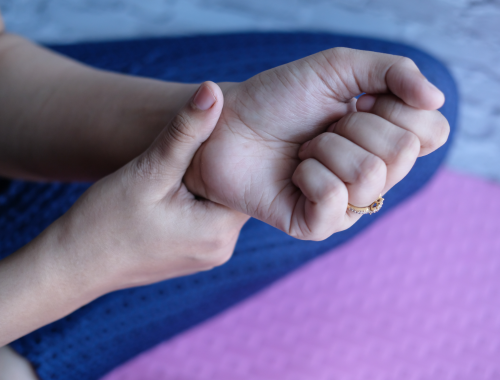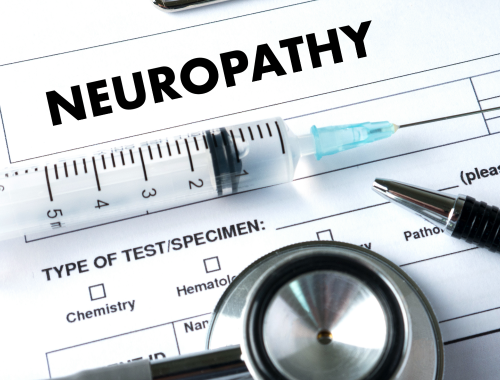Difference Between Paresthesia and Neuropathy
Paresthesia is the feeling of numbness on the skin, or a feeling as if the skin is crawling, or an unknown itching. Neuropathy or peripheral neuropathy is the damage caused to the nerves due to any pathological condition like diabetes etc, and can result in a set of symptoms.

What is Paresthesia?
An uncomfortable feeling of burning, itching or tingling on the skin due to no apparent reason is known as paresthesia. Everyone has experienced paresthesia at some point in their life.
Symptoms
Symptoms of paresthesia are:
- Numbness in limbs
- Pins and needles like sensation, often referred to as “arm or leg has fallen asleep”.
- Sensation of tingling in the affected part
- Itching that doesn’t have any apparent reason and doesn’t resolve easily.
- Chronic pain if paresthesia is due to nerve compression
- Hot or cold sensation
Causes
Causes of paresthesia are usually simple like prolonged pressure on the nerve of the affected limb. Sitting too long in the same position can cause paresthesia of lower limbs. While sleeping for hours on one arm can result in paresthesia of the said arm. This type of paresthesia is usually harmless and is due to poor circulation. It doesn’t require treatment.
However, when paresthesia is caused by nerve damage, it can be chronic and requires treatment. It can be of two types:
- Radiculopathy
- Neuropathy
Radiculopathy is when the root nerves are compressed due to any anatomical or physical pathology. For example herniated disc, anatomical narrowing of nerve canal, a mass or lesion pressing on the nerves, etc. It can present as cervical radiculopathy (neck pain, paresthesia of upper limbs,weakness of affected side of hand and arm)
Neuropathy is when nerves are compressed due to pathological conditions like diabetes, autoimmune diseases, multiple sclerosis, kidney diseases, thyroid diseases, etc. Neuropathy is chronic and requires management of the underlying condition.
This type of neuropathy can become permanent paralysis if left untreated.
Risk factors
Risk factors for paresthesia are:
- People with chronic diseases like Diabetes, MS, rheumatoid arthritis, kidney disease etc.
- People with professional hazard causing the repetitive movement of affected limb
- People with compromised immunity or poor posture
Treatment
Treatment depends upon the underlying cause. If numbness is caused due to hyperglycemia, consider treating the high blood sugar to relieve the symptoms.
If it is due to poor posture or herniated disk, physiotherapy combined with medication and surgery can help.
Take a break if professional hazard is the cause of persistent Paresthesia.
Treating the underlying cause can cure the symptoms most of the times.

What is Neuropathy?
Neuropathy is described as pain or burning sensation as a result of damage to the nerves coming out from the brain and spinal cord. When peripheral nerve damage is involved, it is known as peripheral neuropathy. While autonomic nerves can also be involved.
Types of neuropathy
The three main types of peripheral nerves with respect to their functions are
- Sensory nerves (involved in sensations like heat, cold, pain and tingling)
- Motor nerves (involved in movement and coordination)
- Autonomic nerves (involved in involuntary actions like sweating, salivating etc)
Symptoms
There are different symptoms that can present in peripheral neuropathy. It depends upon the types of nerves affected. Some of the most common ones are:
- Burning sensation
- Pinching pain
- Stabbing pain upon touch
- Unstable movements and lack of coordination while walking
- Lack of sweating or profuse sweating
- Low muscle tone
- Warm hands and feet
- Fluctuating blood pressure
- Paralysis
- Feeling dizzy
- Uncontrolled bowel movements
- Urine inconsistency
Causes
Causes of peripheral neuropathy are
- Chronic diseases like diabetes mellitus
- Multiple sclerosis
- Metabolic diseases like kidney, thyroid and liver diseases.
- Autoimmune diseases and syndromes like Guillain Barre syndrome, lupus, RA, etc.
- Viral and bacterial infections like Epstein Barr Virus, HIV, hepatitis B and C, diphtheria etc
- Immunocompromised patients going through cancer treatments or bone marrow transplant
- Suffering from tumours and neoplasias.
- Medications
- Vitamins and minerals deficiency like B-12 deficiency
- Exposure to harmful chemicals
Complications
If left untreated, neuropathies can result in complications and risk of injuries increases several folds.
Lack of coordination can result in traumatic falls and injuries.
Areas with neuropathy are prone to infections and wounds.
Treatment
Treatment of neuropathy depends upon the underlying cause. It is important to treat the cause first like rheumatoid arthritis, uncontrolled diabetes, infections etc.
After treating the cause, a healthy lifestyle is mandatory to prevent neuropathies. That includes a balanced and healthy diet full of different vitamins, minerals and other nutritional requirements. It Is important not to skip meals and exercise regularly to maintain a balanced and healthy lifestyle.
If professional hazard is the cause of neuropathy, it is important to avoid the trigger factors and adapt to the alternative ways to do the job, as not to stress the nerves and muscles involved. Take small but regular breaks if certain posture is culprit for the pain or neuropathy.
Table Comparing Paresthesia and Neuropathy

Summary of Differences between Paresthesia and Neuropathy
- Paresthesia can cause complete or partial numbness of the area involved while neuropathy causes complete numbness.
- Paresthesia is only related to sensations or sensory branches of nerves while neuropathy involves sensory, motor and autonomic nerves as well.
- Paresthesia can be harmless and mostly self limiting. Neuropathy might need vigorous treatment especially if there is an underlying cause.
- Paresthesia is simple while neuropathy is vast and present as a group of different symptoms.
- Numbness is usually not a symptom of paresthesia while numbness is an important symptom of neuropathy alongwith stabbing pain and other sensations.
FAQs
Is paresthesia the same as neuropathy?
Paresthesia is the sensation of tingling or crawling of skin due to any pressure on nerves while neuropathy is pain or other symptoms due to nerve damage.
Does paresthesia mean nerves are healing?
Paresthesia means nerves are active and able to communicate sensory information from the brain and spinal cord.
How do you know if you have paresthesia?
Paresthesia is usually painless, causing itching or tingling sensation, sometimes accompanied by burning sensation.
What triggers paresthesia?
Chronic diseases like diabetes mellitus and other causes trigger paresthesia.
What is the fastest way to get rid of paresthesia?
Movement in the affected area relieves paresthesia caused due to nerve pressure. Physiotherapy also provides relief.
What is the best treatment for paresthesia?
Physiotherapy and a healthy lifestyle is the best treatment for paresthesia.
When should I worry about paresthesia?
You must see a doctor if paresthesia lasts for a longer period of time and doesn’t go away on exercises or movements.
When is paresthesia permanent?
If the underlying cause like nerve pinching or chronic diseases are not treated, paresthesia can become permanent because of nerve damage.
What happens if paresthesia is untreated?
Paresthesia can result into nerve damage, that can be permanent if left untreated.
- Difference Between Cystocele and Rectocele - September 8, 2023
- Comparison Between DHEA and DHEA Sulfate - September 1, 2023
- Difference Between Osteoporosis and Osteopenia - June 14, 2023
Search DifferenceBetween.net :
Leave a Response
References :
[0]Levin, M. C. (2023, February 14). Numbness - neurologic disorders. MSD Manual Professional Edition. Retrieved March 9, 2023, from https://www.msdmanuals.com/professional/neurologic-disorders/symptoms-of-neurologic-disorders/numbness
[1]Paresthesia. Paresthesia - an overview | ScienceDirect Topics. (n.d.). Retrieved March 9, 2023, from https://www.sciencedirect.com/topics/medicine-and-dentistry/paresthesia
[2]The Royal Australian College of general Practitioners. (n.d.). Paraesthesia and peripheral neuropathy. Australian Family Physician. Retrieved March 9, 2023, from https://www.racgp.org.au/afp/2015/march/paraesthesia-and-peripheral-neuropathy
[3]https://www.racgp.org.au/afp/2015/march/paraesthesia-and-peripheral-neuropathy
